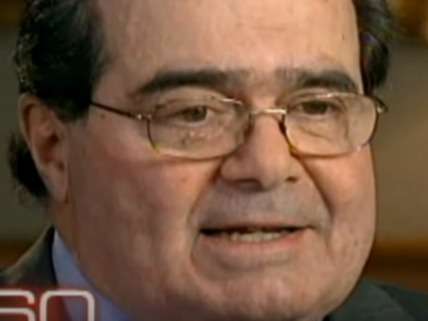Scalia's Mixed Drug War Record
Drug cases show the late justice's fickle fidelity to the Fourth Amendment and federalism.

For many years drug prohibition has been the main factor undermining the Fourth Amendment's ban on "unreasonable searches and seizures." In my latest Forbes column, I explore how Antonin Scalia, who died on Saturday, both assisted and resisted that process during his three decades on the Supreme Court:
In 1989 the U.S. Supreme Court upheld urine testing of applicants for Customs Service jobs that involved carrying a gun, handling classified material, or participating in drug interdiction. Justice Antonin Scalia dissented, calling the urinalysis program an "immolation of privacy and human dignity in symbolic opposition to drug use." Scalia noted that the Customs Service policy required people to perform "an excretory function traditionally shielded by great privacy" while a monitor stood by, listening for "the normal sounds," after which "the excretion so produced [would] be turned over to the Government for chemical analysis." He deemed this "a type of search particularly destructive of privacy and offensive to personal dignity."
Six years later, Scalia considered a case involving much the same procedure, this time imposed on randomly selected athletes at a public high school. Writing for the majority, he said "the privacy interests compromised by the process of obtaining the urine sample are in our view negligible." Scalia deemed the testing program reasonable, noting the importance of "deterring drug use by our Nation's schoolchildren."
As those contrasting cases suggest, Scalia was of two minds when confronted by the government's efforts to suppress consumption of arbitrarily proscribed intoxicants. The widely revered and reviled justice, who died on Saturday, was appointed to the Supreme Court four years after Ronald Reagan declared his War on Drugs and Nancy Reagan launched her "Just Say No" campaign. During the next three decades, Scalia alternately cheered and criticized the vain crusade to achieve a "drug-free society." While he never questioned the goal, he questioned the means used to reach it more often than his critics on the left might think.
Editor's Note: As of February 29, 2024, commenting privileges on reason.com posts are limited to Reason Plus subscribers. Past commenters are grandfathered in for a temporary period. Subscribe here to preserve your ability to comment. Your Reason Plus subscription also gives you an ad-free version of reason.com, along with full access to the digital edition and archives of Reason magazine. We request that comments be civil and on-topic. We do not moderate or assume any responsibility for comments, which are owned by the readers who post them. Comments do not represent the views of reason.com or Reason Foundation. We reserve the right to delete any comment and ban commenters for any reason at any time. Comments may only be edited within 5 minutes of posting. Report abuses.
Please to post comments


C,mon, man, there's a war going on! Everybody knows the Constitution isn't a suicide pact and the exigencies of war mean sometimes your civil rights get curtailed just a wee bit. Once the war's over, you'll get everything back.
And don't forget the DUI canine exception. It's right there in the preamble
Dogs aren't even sentient. Plus they're cute. How could one violate your rights? Next case.
Those first two cases mentioned in the article (Ha! Now you have to read it!) tell you all you need to know about Scalia. He was deferential to authority and didn't care one whit about anyone else. Finding a better justice to replace him should be easy, but we all know that ratchet only goes one way.
we all know that ratchet only goes one way.
There is often that little thingy on the handle you can click to make it go the other way.
Writing for the majority, he said "the privacy interests compromised by the process of obtaining the urine sample are in our view negligible." Scalia deemed the testing program reasonable, noting the importance of "deterring drug use by our Nation's schoolchildren."
Did he write an opinion on caning?
Well, I can't find it, but since wicker and rattan are overwhelmingly imported, most instances of the manufacture of cane furnature will be subject to some form of federal trade regulations under the actual and original meaning of the commerce clause (not the post-Wickard nonsense).
"The People rest, Your Honor."
And the rest of the People?
I'll forgive him his trespasses on this one. Why? Because the people were waging a war. How could he have known that it was a stupid pointless war whose only purpose was to strip people of their freedom so they could be abused and exploited? No one knew that. He was a judge not a god. Generally he was better than most of his colleagues. I hope his replacement will exercise as much constraint.
Want to earn over internet from your couch at home by working easy jobs with your dekstop or laptop for 2-6 h a day, get 56 dollars hourly and get a paycheck at the end of each week and choose yourself the time when you work and for how long. Then start by visiting this link......au.......
http://www.alpha-careers.com
Would it be possible to get the Forbes links to go straight to Sullum's columns the way they used to? The most recent ones just take me to the main Forbes page, and it's kind of hard to even find his columns.
The technology is so developed that we can watch videos, live streaming, TV serials and any of our missed programs within our mobiles and PCs. Showbox
All we need is a mobile or PC with a very good internet connection. There are many applications by which we can enjoy videos, our missed programs, live streaming etc.